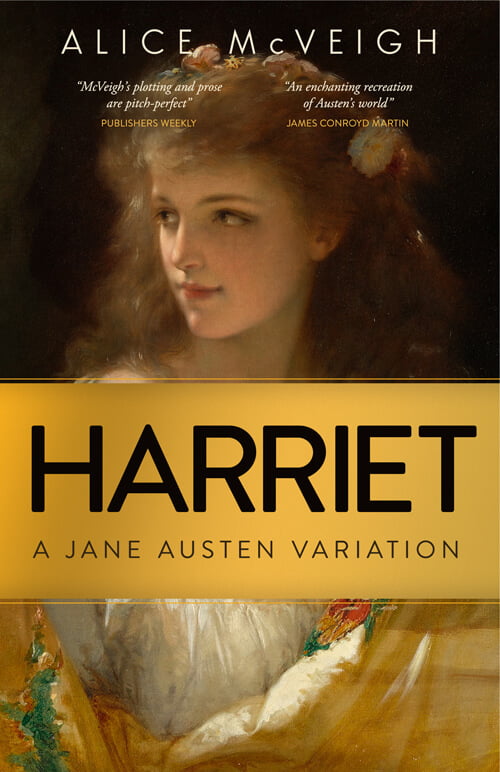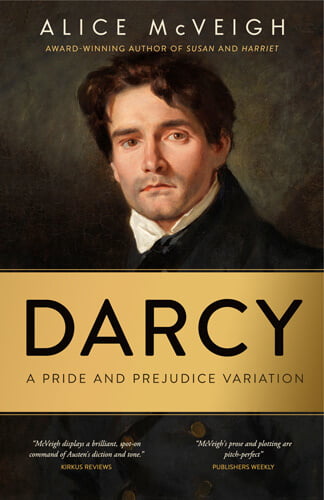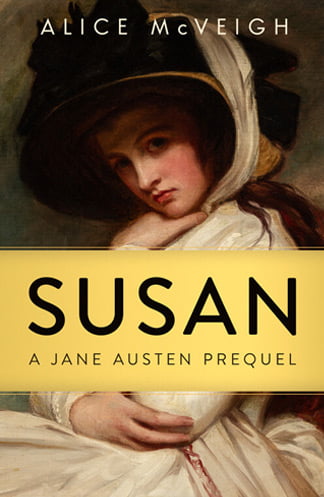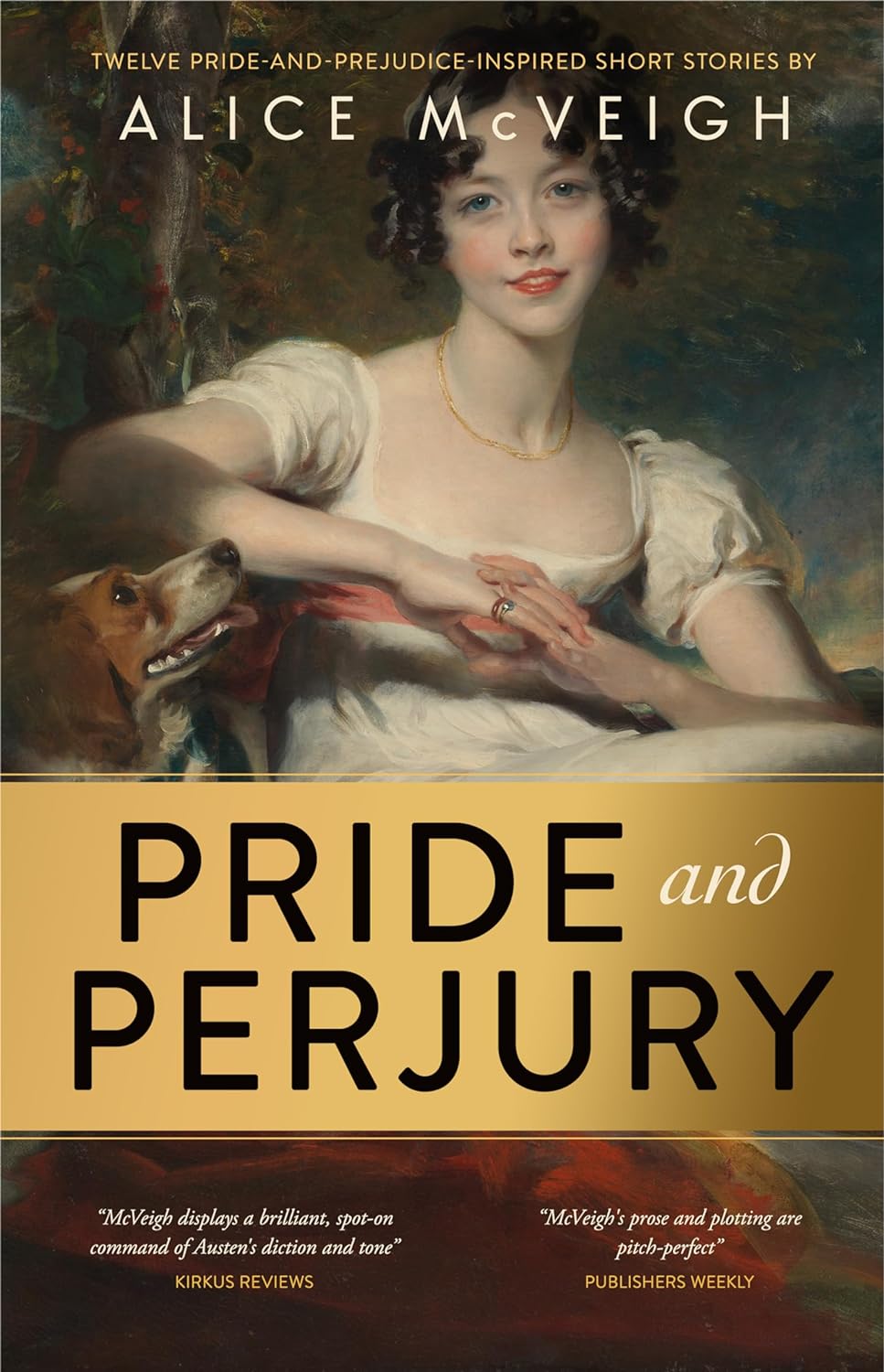Harriet
By Alice McVeigh

HARRIET – an extract
Chapter 1
Harriet Smith
Mrs Goddard said, ‘Harriet, I have delightful news for you.’
I certainly hoped that she had – and news specifically about Hartfield, for I had never spelled harder for an invitation in all my life. I was forever saying such things as, ‘I saw Emma Wodehouse pass by, wearing the sweetest pelisse I ever saw. How I wish I could meet her!’ Or, ‘Miss Woodhouse has just been visiting those poor Turners. I long to tell her how she inspires me, but – to be sure – she must not even know that I exist!’
But these hints, though tedious, had not been polished in vain, for my headmistress continued, ‘I have procured you an invitation – and from Hartfield. Miss Woodhouse has graciously consented to my proposal that you accompany me to dinner on Thursday.’
‘Oh, Mrs Goddard!’ I cried, as if astonished.
‘You need not thank me – in fact, she seemed quite taken with the notion. However, I beg you to say nothing unless applied to, and to behave with the greatest respect to Mr Woodhouse as well as to his daughter. This is a chance that your fellow pupils might envy.’
Which was true, for the other girls were not merely envious, but incredulous. (‘Why choose Harriet? – for no one in the world knows who her family might be, and Amelia is every bit as pretty!’… ‘Nay, I am not jealous, not in the least, for Miss Woodhouse is woefully high, and thinks no one equal to her’… ‘To Hartfield, fancy! Do you suppose Mr Elton might be of the party?’) Though my friend Amelia did consent to loan me her newest shoes, for mine were forlorn indeed. Thus I had the comfort of knowing that, from the ankle downwards at least, my appearance was unexceptionable.
How fast my heart beat as I trotted along the High Street with Mrs Goddard! I knew it all too well, for I had lived in Highbury since I was five, only departing from it to attend a concert in town, or a play at the Little Theatre. How I longed for the day when I might entrance some high-born gentleman, and live in a London Square, and walk my pug about the Serpentine! (For I would have a pug, or – at very least – a Pomeranian, and marrying a gentleman was most assuredly my plan.)
I sometimes found myself wondering if, should I succeed in captivating some Surrey gentleman instead, I might persuade him to move to town. Though whom that might be I could not conceive, for Highbury was just as deficient in young gentlemen as it was in every other particular – with one or two exceptions. What a sad place Highbury was – hardly more than a village, indeed – where every creature either young or personable was forever rushing about without the leisure to enjoy anything – everyone, that is, except for the enviable Miss Woodhouse!
I had already determined that it would serve me exceedingly ill to be my true self with Emma Woodhouse. It was not just her high reputation – it was because I understood what Miss Woodhouse was in want of and suspected that I might be able to supply it.
I had thought a great deal about her situation: lauded, envied and admired, with her independence, her beauty, her £30,000. Her father believed her to be perfection; she enjoyed all the freedom that his family fortune could procure and – though she could have visited Bath, Tunbridge or even London – she chose to reign over Highbury, instead. Thus, I reasoned that Miss Woodhouse preferred to direct rather than to contend – while the loss of her governess had reduced her to all the delights of her aged father’s company.
In short, I believed there to be a vacancy – not for another governess, but for someone youthful and doe-eyed, submissive and easily led, to give the young mistress of Hartfield an object. And though supremely unqualified for the post – in that I was neither submissive nor easily led – I had faith in my powers to appear so.
I would have to dissemble a good deal to succeed in the role. I must never sketch – for I have a modest talent in that regard – and must disguise my taste for music, the better to praise her own performance – something that occasionally gave even Mrs Goddard some qualms of conscience. Above all, Miss Woodhouse must never guess that I hoped to use her as a means of escape. For escape I had determined on – lest Highbury be the death of me!
Mrs Goddard spent the entire walk to Hartfield advising me about what I might expect.
‘Mr Woodhouse is old and seems – I know not how – still older than he is. There is something very pedantic in his air. He is old-fashioned and stately – but he can seem a little slow, somehow. His daughter is just the opposite: she is quick, quick to move, quick to think, quick to act. Perhaps she is a little superior – so people say – yet why should she not be? She has had every conceivable advantage and is extremely handsome, besides.’
‘I have heard that she is direct.’
‘She can be very direct indeed, but so generous! She is forever donating money or giving away legs of pork!… Now, Miss Bates will probably be there and Mr Knightley too – for he half-lives in the house and there is no worthier man – but, no, he cannot be there, for that was why we were invited.’
I was sorry to hear this, for Mr Knightley, though in his thirties, was so very fine a man! I loved to look at him, whether on horseback or on foot, and thought him quite as attractive as Mr Elton, who was adored by all the great girls at school. In fact, I had sometimes wished him rather less distinguished, that I might do more than merely dream about him.
‘… And, in addition, remember to leave a little of every dish, to suggest that you have had enough – though this might not be the case, by-the-bye, for Mr Woodhouse is in a constant fret about his food, and there is no way of knowing how much you might be allowed to eat.’
So said Mrs Goddard as we walked up the great drive at Hartfield, and as I secretly admired the sweep of the short avenue, the stately lines of the mansion and its astonishing number of windows. Within, it was more impressive than I had ever imagined: I envied the size of the hall, the scope of the stairs, and the alacrity of the liveried servants as we were ushered into the drawing room.
I was not overpowered by the introduction to Emma, though I summoned up a trembling curtsey, and what I hoped was a suitable blush. I was far more overpowered by the house, the servants and the china – displayed to perfection on the table, once dinner had commenced. I ventured to praise it, and Emma said tolerantly, ‘Oh, do you like it? It is only our third set, but Papa’s especial favourite, and I wished everything to be to his taste tonight. I hope you are fond of asparagus, Miss Smith?’
I assured her, not only that I was, but that I had never tasted asparagus more delicately flavoured, as I sadly tucked the last tender mouthful beneath my fork… It was still harder to be obedient with the scalloped oysters, but I was determined to leave nothing undone.
Miss Woodhouse spoke oftenest to Mrs Goddard, but when she addressed me, it was all warmth and positivity. (‘May I tempt you to an apple tart, Miss Smith? – for, with your pretty figure, you surely have nothing to fear!’… ‘Perhaps Miss Smith might be persuaded to play at whist. Oh! – have you not yet learned? I would be happy to instruct you. It is a useful skill in any society’… ‘Now here, Miss Smith, your reputation has preceded you. I have long envied Mrs Goddard’s delicate lace collars. How deft those small fingers must be!’)
Miss Woodhouse seemed intelligent, but I was sure she did not guess that, so desperate was I to escape Highbury, I would have wed Mr Woodhouse himself, would that doddering septuagenarian only agree to shift to town… The dinner, in short, did nothing to alter my plans. I suspected that I had entirely deceived Miss Woodhouse, particularly as I had been blessed with a disarming prettiness, being rosy and fair, with a figure both plump and pleasing. Pleasing to the first lady of Hartfield, at least, for I overheard her assuring Mrs Goddard, in a whisper not meant to reach far, ‘Your pupil does you great credit – I also think her quite beautiful!’
At the end of the evening, I curtseyed my thanks, and Emma put out her hand and shook mine very cordially. Mrs Goddard expressed her relief as we settled in the Hartfield coach to be taken home again. ‘How very taken she was with you, Harriet! I should not be surprised if she asked you to come again.’
ISBN: 978-1916882331
Publication: February 2022
Publisher: Warleigh Hall Press
Editions: Paperback, ebook.
A Jane Austen Variation
Harriet is an intriguing and original “take” on Jane Austen’s immortal Emma, by Publishers Weekly‘s 2021 BookLife Prize Quarterfinalist, Alice McVeigh.
Emma, a privileged young heiress, decides to mentor Harriet Smith, a pretty boarding-school pupil, and to matchmake her as eligibly as she can… But how is she to guess that Harriet has a secret?
Meanwhile, the brilliant, penniless Jane Fairfax consents to a clandestine engagement with Frank Churchill – though not daring to confess, even to him, that she is being relentlessly pursued by her best friend’s husband.
Harriet sidelines Emma herself in favour of the ingenious Harriet and the fascinating Jane Fairfax. It is Emma – but an Emma with a surprisingly believable twist in its tail.
Awards
WINNER: Bronze medal (European Fiction) IPPY award (Independent Publishers Book Awards, 2023)
Starred Editor’s Pick (“outstanding”) on Publishers Weekly
Current Finalist, Foreword Indies Book of the Year
Current Finalist in Chanticleer’s CIBA Chatelaine Award
BRONZE MEDAL (European fiction) in the Independent Publisher Book Awards (the IPPYs) 2023
Winner: Gold Medal (historical) Global Book Awards, 2022
Selected: as one of “100 notable Indies of 2022” by Shelf Unbound Magazine
Finalist: International Book Awards (historical fiction)
Honoree: IndieBRAG medallion, 2022
Finalist: American Fiction Awards, 2022 (historical fiction)
#1 Bestseller in several categories on Amazon.com
Silver Award, Literary Titan
Indie Reader-Approved
Click HERE to buy on Amazon.



